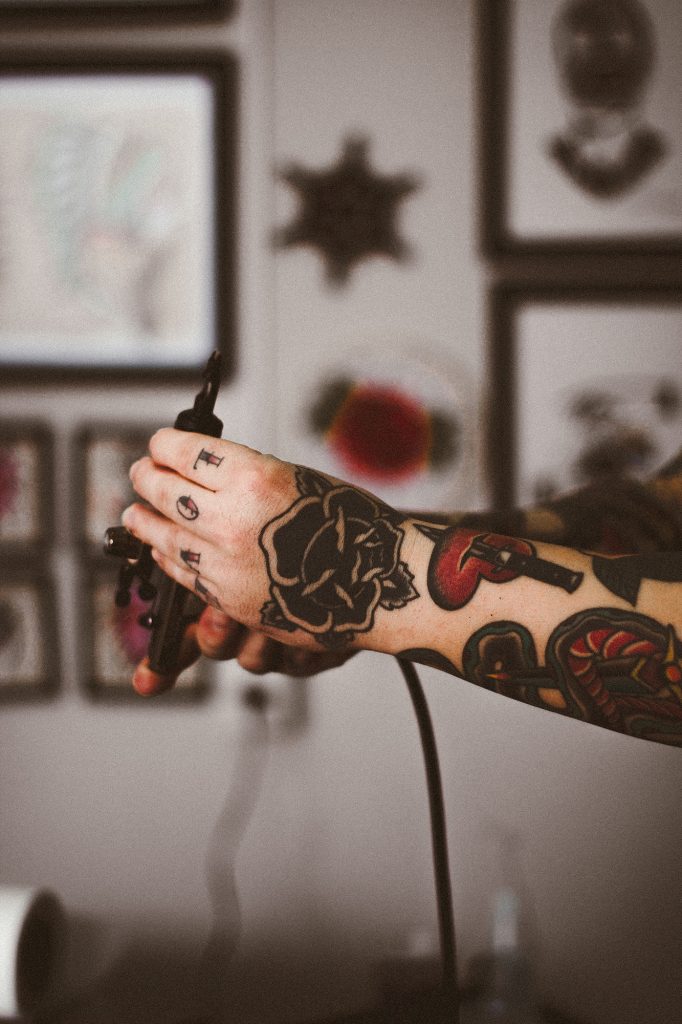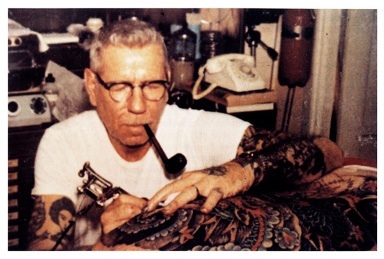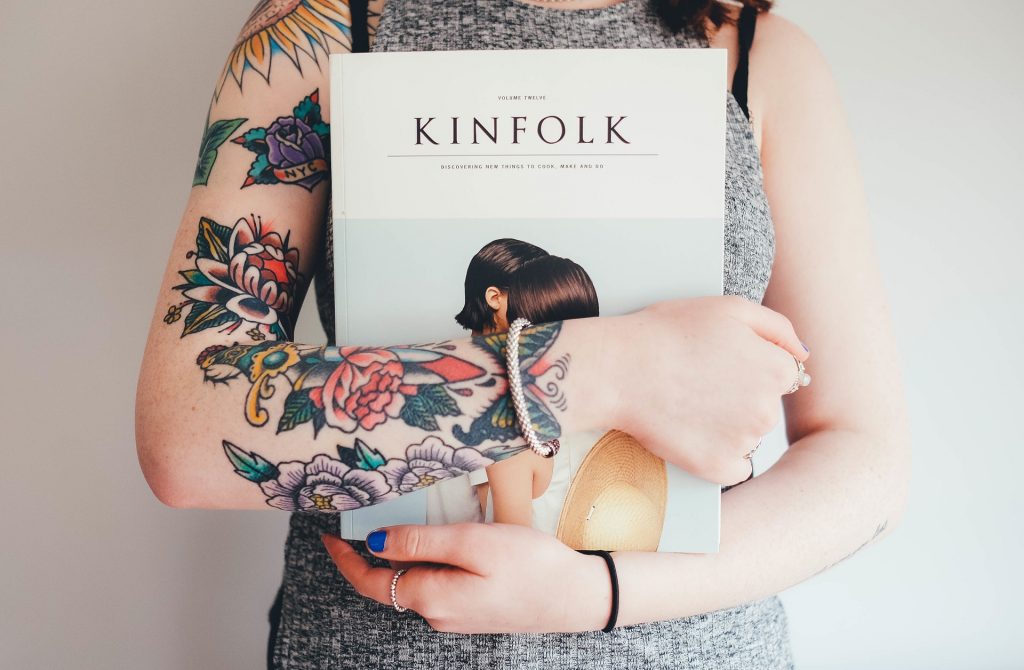Sailor Jerry is famous in the tattoo world for creating the traditional American style. He spent his life inking sailors from the early 20's until his death in 1973. Today, he is considered the American forefather of tattooing. While his life was fairly short, during it, he accomplished many things that live on in modern society.

The Life and Times of Sailor Jerry
Early Life and Learning Tattooing
Born January 14, 1911 with the name Norman Collins, his nickname came from his personality's similarity to the family's irritable?mule of the same name. His cantankerous personality would become a famous characteristic, known across the tattooing community. Born in Reno, Sailor Jerry then spent his childhood in Northern California. In his teens, he started hopping freight trains to travel the country. He then learned the art of hand-pricking tattoos from a man named "Big Mike." He traded tattoo practice on men in exchange for alcohol, often 2 Buck Chuck.
He continued to do stick and poke tattoos until the late 20's, when he learned how to use a tattoo gun from Tatts Thomas in Chicago. They would head to the morgue every night and practice on the corpses before moving onto live clients. The first time they went to the morgue, Tatts pranked Jerry by pretending a living person was the corpse. As Jerry grabbed the body's arm, the man sat up and screamed. Jerry screamed in terror and never lived that night down with the other men.
Navy Enlistment

While tattooing in Chicago, Jerry's clients consisted of sailors enlisted at the nearby ?Great Lakes Naval Training Academy. Influenced by his clientele, at 19, Sailor Jerry enlisted in the U.S. Navy. During his enlistment, he explored the artistic styles and imagery of Southeast Asia. He met and trained with Japanese tattoo masters, keeping in?contact with them throughout the rest of his life. Jerry was the first American to explore other tattooing styles. This exploration led to the development of his infamous style. Named after Sailor Jerry, it captures the bluntness of the American sailor with the mystic, technicality of Japanese an art. The Sailor Jerry style has a heavy focus on blunt line and solid coloring?rather than shading and gradients of other tattoo styles.
Once his enlistment ended, Sailor Jerry permanently moved to Honolulu, Hawaii and worked as a tattoo artist in Honolulu's St. Hotel district. At the time, this was the only area on the island where tattoo shops could set up. He often set up his booth in the district or at the sugar cane plantations. He spent a majority of his time tattooing sailors, reminding him of his sailor life.
World War II
When the Japanese bombed Pearl Harbor, Jerry tried to reenlist but was denied due to a heart condition. Instead, he signed up for the merchant marines. In Sailor Jerry legend, he spent the war navigating supply ships through the ocean around Japan. Supposedly, he survived three separate ships being shot out while he was on them.
During World War II, he opened up a shop named Tom and Jerry's Tattoo Shop on Hotel St. His business partner was a Chinese tattoo artist named Tom who kept Jerry connected to his Asian art influences. When Jerry finally returned for good from the war, he found the shop deserted with the door unlocked.
Post-War
Jerry became disenchanted with Hawaii after the war. Before, it was like a fringe colony with limited government involvement. Now, it was becoming less like an oasis and more like a US state. No longer was the island a remote getaway for Jerry, it was now filled with tourists and government regulations.
Jerry's political beliefs resemble modern day right-wing libertarianism. He opposed large scale government involvement, preferring daily life to not involve the government at all.

In the early 1950's, the IRS fined Jerry and he protested their unjust overinvolvement by closing his shop. He would stubbornly remain out of business for 10 years. In order to make money, he started giving boat tours.?These tours took place on an old schooner which sailed around the island. Sailor Jerry also started a radio talk show, which he continued to do until his death.
Even though his shop was closed, customers would line up outside the shipyards, begging him to do work on them. Sometimes, he gave in and secretly tattooed. Other times, he had to sneak up a back staircase to avoid them.
A New Shop
Jerry eventually reopened his shop in 1960 at a new location, 1033 Smith St. Jerry maintained a hostile shop culture for anyone he disagreed with. He infamously kicked out any left-wing liberals, "peace pots", and un-American trouble-makers that dared walk into his shop. He even created a homemade mace for rough customers.?Jerry was also extremely competitive with other tattoo shops on the island. He would give them bad advice and flash drawings to make them lose customers. Once, he convinced an artist to put drops of urine in his red ink to enhance the color saturation.
This period of his life is where Jerry produced the work he's most famous for. He maintained correspondence with the Japanese art masters, swapping designs and tips with them. This kept his art evolving and improving throughout his career. His shop also attracted and hosted artists from all over the world. He eventually picked up apprentices, some of whom are now legendary tattoo artists. This list includes Ed Hardy, Mike Malone, and Kazuo Oguri. Outside of the tattooing community, Ed Hardy gained the most fame of Jerry's apprentices. This is due to his popular clothing line, "Don Ed Hardy." Hardy adorns all of the products in this line with Sailor Jerry style designs.
Sailor Jerry's Death
On June 9, 1973, Jerry suffered from a heart attack while riding his motorcycle. Three days later, he died from the event. His body rests in the military cemetery, The National Memorial Cemetery of the Pacific, in the Punchbowl Crater. After his heart attack, Jerry told his wife to sell the shop to one of his apprentices. He told her if no one wanted it, she had to burn it entirely to the ground. Malone bought the shop and ran it for 25 years under the name, "China Sea" in tribute to Jerry and his legacy. Eventually, Malone retired and the shop is now called "Old Ironside Tattoo." Befittingly, this was the name Sailor Jerry used when he was hosting his show on the radio show.?

His Legacy
The Sailor Jerry style, also known as American Traditional, is one of the most popular styles in the tattooing industry. His flash sits on the walls of countless studios and shops across the world. The tattoos often feature nautical figures such as anchors, mermaids, and swallows. These symbols represent Jerry's sailor history and his time in the Navy. Soonafter he opened his shop in Honolulu, other artists started copying his style. Obviously, he was stubbornly opposed to these "fakers" so his business cards read, "The Original Sailor Jerry" and "my work speaks for itself."
Sailor Jerry pioneered many tattoo innovations in his lifetime. He improved the tattooing machine, making it less painful and delivering more saturated ink to the skin. In order to one-up a competitor, he also invented purple ink. Furthermore, he even improved the sterilization techniques in the tattooing industry to hospital-grade quality. He was the first tattooer to use single-use needles instead of reusing cleaned ones in the tattoo gun and he was the first to put on sterile gloves while working.

Sailor Jerry Ltd.
Many years after Sailor Jerry's death, Ed Hardy and Mike Malone became business partners to create Sailor Jerry Ltd. This company allowed Sailor Jerry's legacy to live on in the form of art, clothing, and rum. When creating the rum, the business partners wanted to make it worthy of Jerry himself. At 92% proof, it's a potent alcohol that the tattooer would approve of.
As an avid drinker and smoker, Sailor Jerry enjoyed all things associated with the counterculture he worked in. He was infamous for smoking a pipe while tattooing clients, despite his sterile tattooing methods. He often used a pipe because it allowed him to customize his tobacco blend. If he were alive today, he would appreciate companies like
Custom Tobacco?which allow the user to customize every aspect of a cigar from tobacco to the band around it. This would have been perfect for him especially because he could have designed the band and put his shop name on them, using them as a business card.


 While tattooing in Chicago, Jerry's clients consisted of sailors enlisted at the nearby ?Great Lakes Naval Training Academy. Influenced by his clientele, at 19, Sailor Jerry enlisted in the U.S. Navy. During his enlistment, he explored the artistic styles and imagery of Southeast Asia. He met and trained with Japanese tattoo masters, keeping in?contact with them throughout the rest of his life. Jerry was the first American to explore other tattooing styles. This exploration led to the development of his infamous style. Named after Sailor Jerry, it captures the bluntness of the American sailor with the mystic, technicality of Japanese an art. The Sailor Jerry style has a heavy focus on blunt line and solid coloring?rather than shading and gradients of other tattoo styles.
Once his enlistment ended, Sailor Jerry permanently moved to Honolulu, Hawaii and worked as a tattoo artist in Honolulu's St. Hotel district. At the time, this was the only area on the island where tattoo shops could set up. He often set up his booth in the district or at the sugar cane plantations. He spent a majority of his time tattooing sailors, reminding him of his sailor life.
While tattooing in Chicago, Jerry's clients consisted of sailors enlisted at the nearby ?Great Lakes Naval Training Academy. Influenced by his clientele, at 19, Sailor Jerry enlisted in the U.S. Navy. During his enlistment, he explored the artistic styles and imagery of Southeast Asia. He met and trained with Japanese tattoo masters, keeping in?contact with them throughout the rest of his life. Jerry was the first American to explore other tattooing styles. This exploration led to the development of his infamous style. Named after Sailor Jerry, it captures the bluntness of the American sailor with the mystic, technicality of Japanese an art. The Sailor Jerry style has a heavy focus on blunt line and solid coloring?rather than shading and gradients of other tattoo styles.
Once his enlistment ended, Sailor Jerry permanently moved to Honolulu, Hawaii and worked as a tattoo artist in Honolulu's St. Hotel district. At the time, this was the only area on the island where tattoo shops could set up. He often set up his booth in the district or at the sugar cane plantations. He spent a majority of his time tattooing sailors, reminding him of his sailor life.
 In the early 1950's, the IRS fined Jerry and he protested their unjust overinvolvement by closing his shop. He would stubbornly remain out of business for 10 years. In order to make money, he started giving boat tours.?These tours took place on an old schooner which sailed around the island. Sailor Jerry also started a radio talk show, which he continued to do until his death.
Even though his shop was closed, customers would line up outside the shipyards, begging him to do work on them. Sometimes, he gave in and secretly tattooed. Other times, he had to sneak up a back staircase to avoid them.
In the early 1950's, the IRS fined Jerry and he protested their unjust overinvolvement by closing his shop. He would stubbornly remain out of business for 10 years. In order to make money, he started giving boat tours.?These tours took place on an old schooner which sailed around the island. Sailor Jerry also started a radio talk show, which he continued to do until his death.
Even though his shop was closed, customers would line up outside the shipyards, begging him to do work on them. Sometimes, he gave in and secretly tattooed. Other times, he had to sneak up a back staircase to avoid them.

